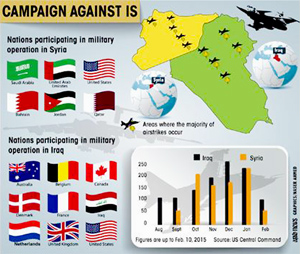Riyadh, Feb 19: Military chiefs from more than 22 countries battling the Islamic State (IS) group began talks here Wednesday to assess the coalition’s current strategy and map out a plan to tackle other terrorist groups operating in the Middle East.
A formal reception was hosted for the military chiefs of the foreign countries at a local hotel on Wednesday night, a diplomatic source, who requested anonymity, said.
This led to an informal round of discussions, but the main talks are scheduled for Thursday, he said. This high-powered military meeting is significant because of the growing threat posed by IS.
The meeting also coincides with the Summit on Countering Violent Extremism, which started in the US Wednesday.
The summit will highlight domestic and international efforts to prevent violent extremists and their supporters from radicalizing, recruiting, and inspiring individuals and groups.
The talks in Riyadh would include a general assessment of the coalition’s battle against IS, said another diplomat.
“It is more an exchange of information and a chance for coordination,” he said.
The talks also coincide with the rise of IS in Libya, which has heightened concerns in the region. The group seized parts of Iraq and Syria last year.
Arab states have intensified their bombing of IS targets since the militants in early February killed the Jordanian fighter pilot Maaz Al-Kasaasbeh, whose plane went down over Syria last year.
Bahrain has decided to send forces to Jordan to support the country and the international coalition.
Last week, the UAE sent an F-16 squadron to Jordan as part of its support for the coalition. Jordan’s information minister said Bahrain had deployed fighter jets in the kingdom to support the anti-IS air campaign.
Saudi Arabia and its Western allies including the US, France, and Germany have been participating in the airstrikes against IS in Syria since September last year.




Comments
Add new comment